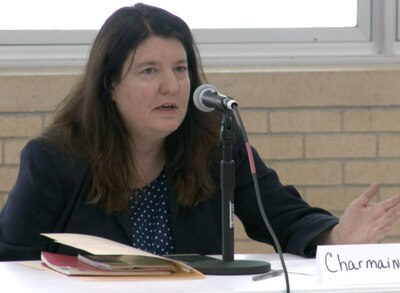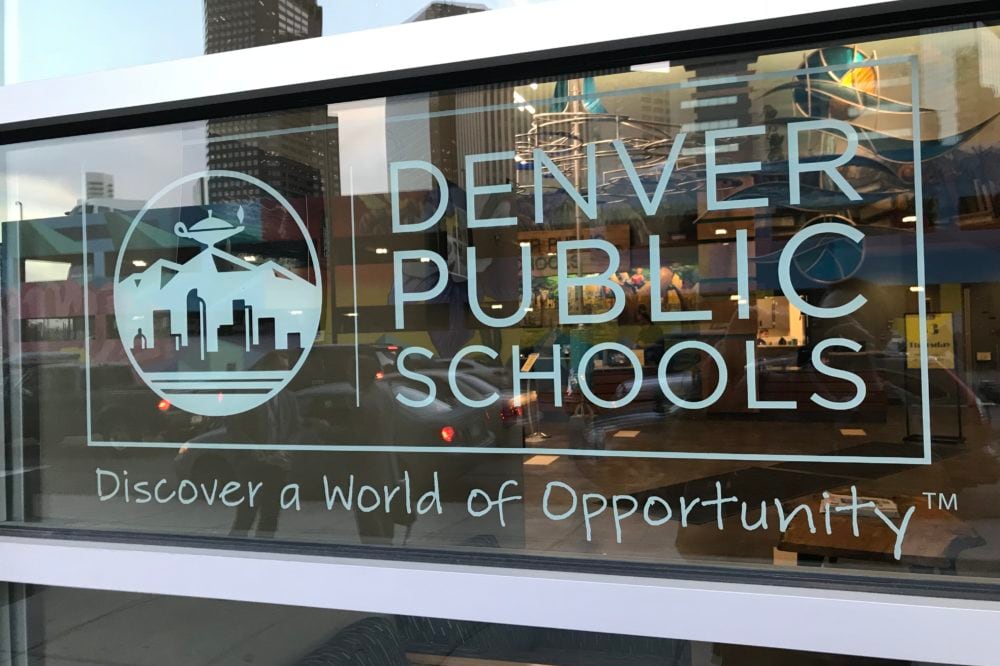After nine rounds of voting and a tense discussion Thursday that revealed frayed relationships between Denver school board members, the board appointed family law attorney Charmaine Lindsay to fill a vacant seat.
Lindsay will serve the remaining 17 months of the term of former board member Brad Laurvick, a Methodist pastor who resigned from the board because he is relocating for his job. Elected in November 2019, Laurvick served through most of Thursday’s board meeting, stepping down at the end so the other members could appoint his replacement.
The discussion among the other six members was marked by sadness, frustration, and concern about the board’s ability to work together. Allegations of dysfunction have dogged the board since 2020, when the Denver mayor and others blamed board members for the resignation of former superintendent Susana Cordova. A new superintendent, a new board governance structure, and new board members elected in 2021 who shared the backing of the Denver teachers union presented the board with a chance for a fresh start.
But despite sharing similar political views on education, board members haven’t been united, with much of the spring taken up by extended debate on school autonomy that isn’t settled yet.
For several rounds of voting Thursday, the six remaining members were split on who to appoint. Five people applied to fill the vacancy but one later dropped out, leaving four candidates.
“I can see where we’re headed, and I’ve shared with each of you privately that I’m really worried about the health of our board in moving forward,” board member Carrie Olson said. “No matter where we land on this vote, I’m concerned that we need to all be able to come together.”

Board Vice President Tay Anderson and members Scott Esserman and Michelle Quattlebaum initially supported Lindsay, while Olson, President Xóchitl “Sochi” Gaytán and member Scott Baldermann supported another applicant, former Denver teacher Julie Bañuelos.
Gaytán noted that Bañuelos ran for the board seat representing northwest Denver in 2019 and came in a close second behind Laurvick in a three-way race. Olson said Bañuelos understands the district and has deep roots in the northwest community, which is home to many Latino families. Bañuelos is Latina, a member of the LGBTQ+ community, and bilingual.
But Anderson and Quattlebaum expressed concerns, including about an interaction in which Bañuelos asked Quattlebaum, who is Black, “Do you speak for the Latinos too? Do you speak Spanish?” The interaction happened last month while the board was publicly interviewing applicants for the vacancy. Quattlebaum said she found Bañuelos’ questions condescending and was hurt her colleagues didn’t speak up.
Anderson said that while he and Bañuelos share many of the same views, he could not vote for her because of how she reacted to secondhand sexual assault allegations levied against him last year. A district investigation found those allegations were unfounded. Anderson grew emotional as he described the impact of the accusations, including threats against his family.
Esserman and Gaytán had a heated exchange about a Zoom meeting that took place between Esserman, Anderson, and Bañuelos as part of the board’s efforts to interview applicants. Bañuelos brought an attorney to the virtual meeting, a decision Esserman said was problematic.
Gaytán defended Bañuelos’ actions.
“As a woman of color, I understand that,” Gaytán said. “I understand when there’s two men that behaved a certain way in an interview, if you’re not sure if they’re going to come at you some kind of way, you’re going to feel —”
“I will not be attacked by you in any comment,” Esserman said, interrupting her. “I did not behave in any way inappropriately in any interview at any point, and I will not be told that I was.”
Anderson also objected to Gaytán’s characterization. “I take great offense to that, as you painted me as an aggressive Black man trying to attack a woman,” he said.
“I did not say that,” Gaytán said.
In supporting Lindsay for the vacancy, Anderson touted her experience as a parent and her legal experience as a trained mediator, saying the board could use her skills. He noted that Lindsay holds no political allegiances and told the board she’s uninterested in running for election when the northwest seat comes open in November 2023.
“This has been one of the most tumultuous times I have sat on this board because of the way that we govern, the way that we interact with one another,” Anderson said.
“Charmaine may not be our No. 1 choice, for some, but I do believe Charmaine brings the perspective of a trained mediator, and we gotta get our house together.”
Following Anderson’s comments, Olson joined Anderson, Esserman, and Quattlebaum in voting to appoint Lindsay to the board. Olson had voted no on Lindsay in four prior rounds of voting.
“I agree with Director Anderson that this vote has been particularly stressful,” Olson said, “and in speaking with many of my board colleagues, we’ve shared tips on panic attacks. It’s been a rocky road. There’s just a lot going on. I think it’s healthy for our board to get somebody in this seat and for us to be able to move forward to start building a team together.”
The board plans to hold a retreat next Thursday, and several members said it was important for the newest member to be there. The board will also hold a special meeting that afternoon to vote on revising a controversial new policy affecting semi-autonomous innovation schools.
The five people who applied to fill Laurvick’s seat were Lindsay, Bañuelos, Leonard “Leo” Darnell, David Diaz, and Adeel Khan. Diaz dropped out of the running before the vote and threw his support behind Bañuelos, who also had the support of a number of Latina elected officials.
Over the next 17 months, the board will grapple with several big issues, including how to address declining enrollment and the possibility of closing or consolidating small schools.
Melanie Asmar is a senior reporter for Chalkbeat Colorado, covering Denver Public Schools. Contact Melanie at masmar@chalkbeat.org.






